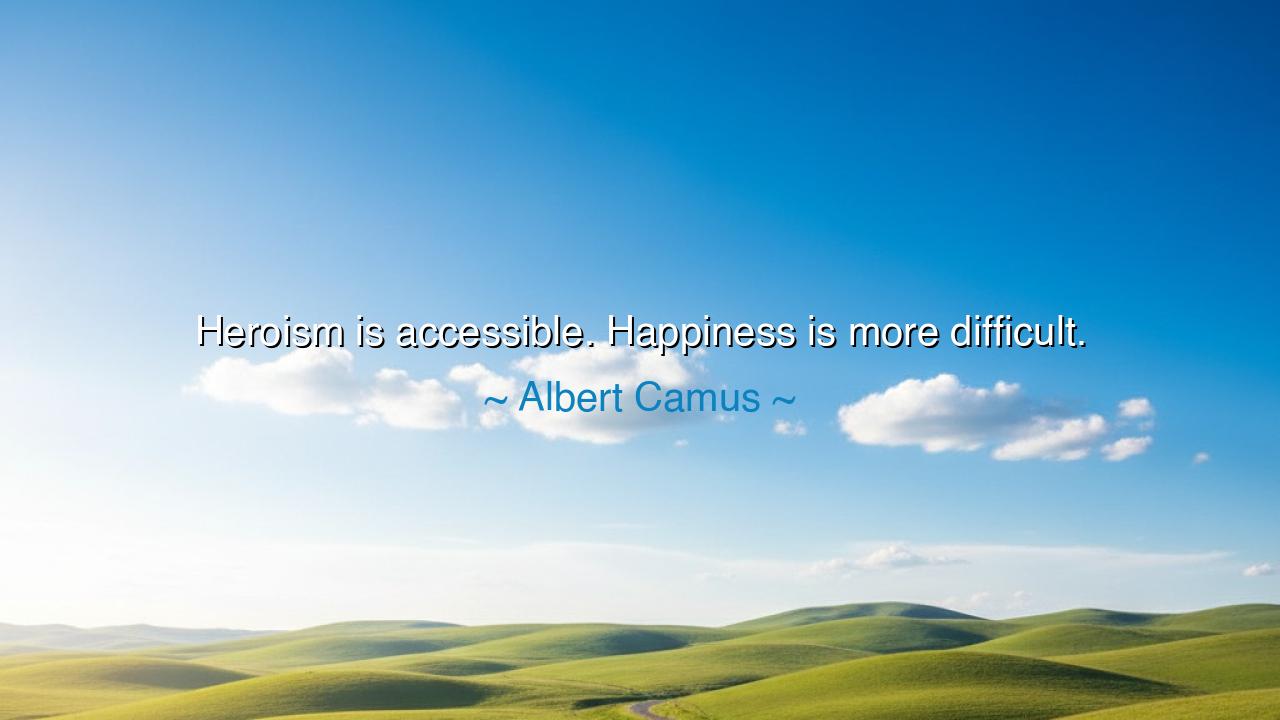
Heroism is accessible. Happiness is more difficult.






When Albert Camus wrote, “Heroism is accessible. Happiness is more difficult,” he spoke with the quiet intensity of a man who had gazed deeply into the paradox of the human soul. These words, forged in the furnace of his reflections on life’s absurdity and struggle, reveal a truth both humbling and profound—that while acts of heroism may flash brightly and briefly, the quiet, enduring pursuit of happiness demands far greater strength. It is easier, Camus tells us, to rise for a moment of sacrifice than to live a lifetime of peace within oneself. Heroism can erupt from passion, but happiness requires daily labor—discipline of the heart, serenity of mind, and courage in stillness.
Camus, born amid the stark beauty of Algeria and shaped by the chaos of war, was no stranger to the heroism of his time. He lived through an age of violence—resistance, oppression, and revolt—and he admired the moral valor of those who stood against tyranny. Yet, in his philosophical solitude, he discovered that the rarer, quieter triumph was not found on the battlefield but within the heart. For heroism, though glorious, belongs to moments; happiness belongs to the slow unfolding of a life. One can risk death in an instant, but to live meaningfully every day—to awaken each morning and choose joy despite suffering—this, he believed, is the greater test of human courage.
In the ancient world, the Greeks revered both the hero and the sage. Achilles, fierce and shining in his brief life, embodies the heroic spirit—the will to act, to defy fate, to burn brightly even if briefly. But beside him stands Socrates, calm and unyielding, who found contentment in wisdom, moderation, and truth. Achilles conquered men; Socrates conquered himself. And so the ancients taught what Camus later rediscovered: that heroism is born of passion and defiance, but happiness is born of understanding and acceptance. The former is a flame; the latter, a steady light that endures the night.
Consider the life of Camus himself during the French Resistance. He wrote, printed, and distributed clandestine papers at risk of death. This was heroism, undeniable and immediate. Yet when the war ended, and victory was won, he found himself facing a different kind of emptiness—a world disillusioned, torn by ideology, and weary of violence. “The struggle itself,” he wrote in The Myth of Sisyphus, “is enough to fill a man’s heart.” In those words, he sought a path to happiness not in conquest, but in acceptance—in the simple act of living fully, even when life seemed absurd. The hero fights for a cause; the happy man fights for meaning.
Heroism often demands the shedding of the self—it asks us to forget comfort, fear, and even life itself for something greater. But happiness requires us to return to the self and tend it with care, humility, and patience. It is easier to die for an ideal than to live faithfully by it. The martyr’s courage is swift and consuming; the seeker’s courage is patient and unending. That is why Camus said happiness is more difficult—because it is not achieved by one grand gesture, but by countless small ones. It is the art of finding peace in imperfection, of embracing the world not as it should be, but as it is.
And yet, Camus did not mean to belittle heroism—he sought to elevate happiness to its rightful place beside it. He wished to remind us that a life well-lived is not measured only by our moments of greatness, but by our capacity for gratitude and joy. The man who builds happiness within himself builds something eternal, for while heroic acts may echo through history, a happy spirit sustains the living world. The hero saves others for a moment; the happy person heals them for a lifetime.
So, my child of thought and courage, take this wisdom as your inheritance: seek not only the courage to act, but the courage to be content. Do not wait for the grand struggle to prove your worth; find meaning in the quiet labor of your days. Be heroic when duty calls, but strive always for the deeper mastery—the happiness that arises from compassion, patience, and love. Remember that the true victory is not over death, but over despair; not over enemies, but over the restlessness of the heart. For in the end, as Albert Camus taught, heroism can belong to any man for a moment—but happiness, hard-won and steadfast, belongs only to the wise.






AAdministratorAdministrator
Welcome, honored guests. Please leave a comment, we will respond soon